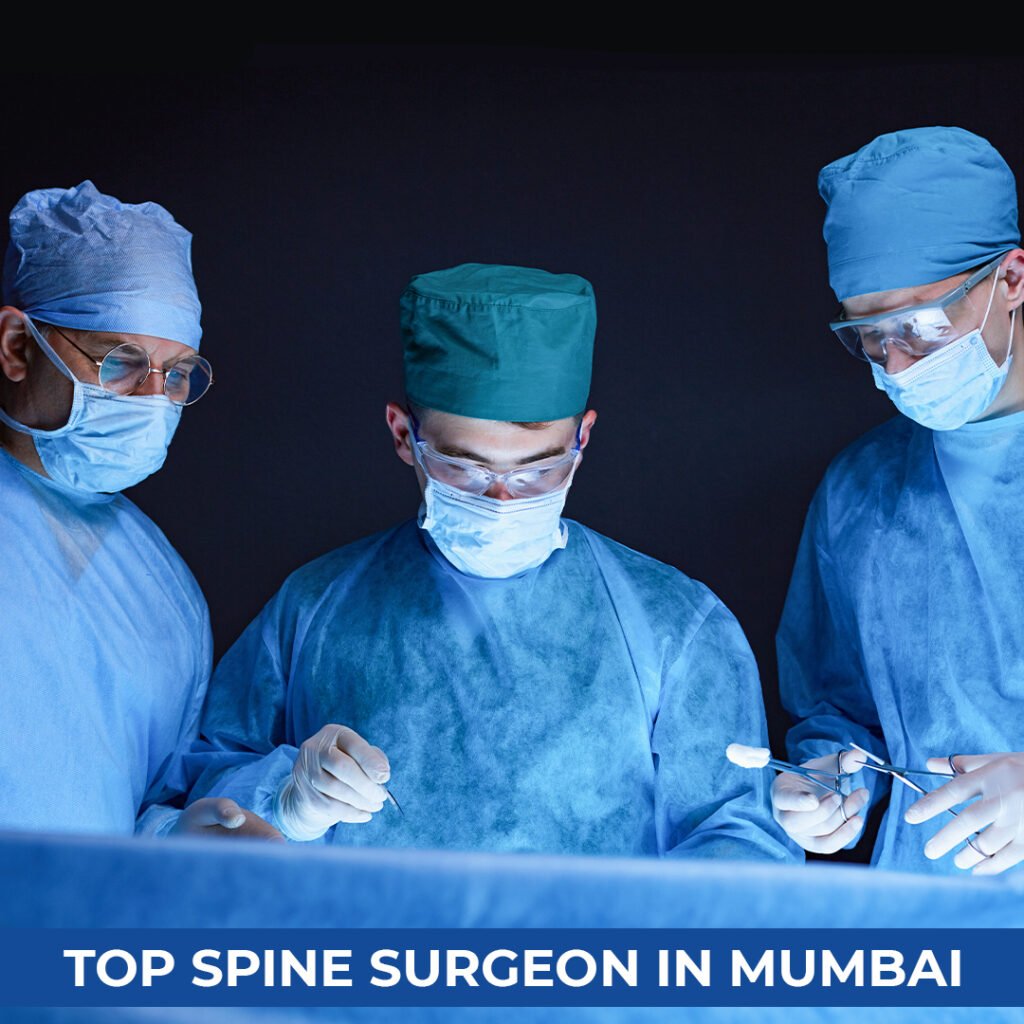

Mumbaikar's You Deserve the Best! Get Professional Care for Spine Surgery in Mumbai : We Are Spine Clinic
Spine surgery is a medical procedure to correct problems with the spinal cord or nerves, relieve pain, and restore function. The surgery is typically recommended when conservative treatments such as medication, physical therapy, and rest have failed to provide relief. Spine surgery in Mumbai is a complex and delicate procedure that requires the expertise of a trained and experienced surgeon. If you’re considering spine surgery, Mumbai is a great place to get it done.


We Are Spine is a team of highly skilled and experienced spine surgeons under super vision of Mumbai best Spine Surgeon Dr. Shekhar Bhojraj committed to providing the best possible care to patients with spine-related issues. We use the latest technology and surgical techniques to provide safe and effective treatments to our patients. Spine surgeons from the We Are Spine Team are trained to diagnose and treat various spine-related issues. We use our expertise and skills to provide safe and effective surgical treatments to patients with herniated discs, spinal stenosis, and degenerative disc disease.
We use the latest surgical techniques and technologies to ensure our patients receive the best possible care. We also work closely with other medical professionals to provide a comprehensive treatment plan tailored to each patient’s individual needs.

In conclusion, Mumbai is home to several world-class spine surgery centers and hospitals that offer the latest treatments and procedures to help alleviate your symptoms and improve your quality of life. Whether you need a back operation, spine operation, or any other spine-related surgical procedure, a team of experienced spine surgeons in Mumbai can help you.
Spine surgery hospitals in Mumbai are attached with WE ARE SPINE Lilavati Hospital, Breach Candy Hospital, Saifee Hospital, and HN Reliance Hospital, which provide a complete range of services to patients with spine-related issues. They have state-of-the-art facilities and employ highly skilled and experienced spine surgeons who are well-versed in the latest surgical techniques and technologies. Spine surgery centers in Mumbai hospitals have dedicated spine surgery and rehabilitation units where patients receive personalized care and attention. They also have a team of physiotherapists who provide post-operative care and help patients regain mobility and strength.

Types of Spine Surgeries
Discectomy: This type of surgery involves removing a portion of a herniated disc by pressing on a nerve. Discectomy is usually performed for conditions such as sciatica or herniated disc.
Fusion: Spinal fusion is a procedure in which two or more vertebrae are fused to provide stability and reduce pain. This procedure is typically performed for degenerative disc disease or spinal stenosis.
Laminectomy: This surgical procedure involves removing a portion of the bone or ligament that is compressing the spinal cord or nerves. Laminectomy is usually performed for conditions such as spinal stenosis or herniated disc.
Artificial disc replacement: This procedure involves removing and replacing a damaged disc with an artificial one. Artificial disc replacement is a newer procedure for degenerative or herniated disc disease.
Preparing for Spine Surgery
- Preparing for Spine Operation involves several important steps to ensure a safe and successful procedure and a smooth recovery.
- Medical Evaluation – A medical evaluation is necessary to assess the patient’s overall health and identify any potential risks or complications associated with the surgery.
- Medications and Supplements – Medications and supplements may need to be adjusted or discontinued before the surgery to prevent bleeding or other adverse effects.
- Lifestyle Changes – Lifestyle changes like quitting smoking, increasing physical activity, and maintaining a healthy diet can also promote healing and reduce the risk of complications.
- Expectations for Recovery – Patients should have realistic expectations for recovery, including physical therapy, pain management, and restrictions on certain activities.
Benefits of Spine Surgery
- Relief from pain and discomfort
- Improved mobility and function
- Improved quality of life
- Reduced need for medication and other treatments
- Faster recovery time
Risks of Spine Surgery
- Infection
- Blood loss
- Nerve damage
- Pain at the incision site
- Difficulty breathing
Common Spine Conditions Requiring Surgery
The back may be necessary to treat various conditions affecting the spinal column. The following are some of the most common spine conditions that may require surgery:
- Herniated discs occur when a spinal disc’s soft, gel-like center bulges out through a tear in the outer layer, putting pressure on nearby nerves. This can cause pain, numbness, and weakness in the affected area.
- Spinal stenosis is a spinal canal narrowing that puts pressure on the spinal cord and nerves, leading to pain, numbness, and weakness in the legs and arms. This condition can be caused by age-related wear and tear or spinal injuries.

- Scoliosis is a condition in which the Spine curves abnormally to the side, leading to uneven hips and shoulders, back pain, and breathing difficulties in severe cases. This condition can be congenital or caused by age-related degeneration.
- Degenerative disc disease is a condition that occurs when the discs between the vertebrae in the Spine start to break down, leading to pain, stiffness, and reduced mobility. This condition can be caused by age-related wear and tear or spinal injuries.
While conservative treatments such as medication, physical therapy, and lifestyle changes may be effective in treating these conditions, spine surgery may be necessary in cases where these treatments fail to provide relief. It is important to consult a spine surgeon to discuss the best treatment options for each case.
Expert in Following Surgeries / Treatments
- Arachnoiditis
- Back injury
- Cervical spinal stenosis
- Chronic pain
- Coccydynia
- Degenerative disc disease
- Discitis
- Facet syndrome
- Failed back syndrome
- Injury
- Kyphosis
- Lordosis
- Low back pain
- Lumbar disc disease
- Lumbar spinal stenosis
- Myelitis
- Spinal muscular atrophy
- Spinal stenosis
- Spinal muscular atrophy
- Tetraplegia
- Transverse myelitis
- Myelopathy
- Neck pain
- Neurological disorder
- Osteoarthritis
- Osteomyelitis
- Osteophyte
- Osteoporosis
- Paralysis
- Paraplegia
- Radiculopathy
- Scheuermann's disease
- Sciatica
- Scoliosis
- Spina bifida
- Spinal cord compression
- Spinal cord injury
- Spinal disease
- Spinal disc herniation
- Spinal fracture
- Vertebral compression fracture
- Whiplash
Before Spine Surgery
After Spine Surgery
The type of spine surgery you need will depend on your individual condition. Your spine surgeon will review your medical history, imaging studies, and conduct a physical examination to determine the best course of action.
All surgeries carry risks and potential complications, including infection, bleeding, nerve damage, and anesthesia-related complications. Your spine surgeon will discuss the specific risks and potential complications associated with your surgery.
The length of your hospital stay will depend on the type of spine surgery you have and your individual circumstances. Some procedures can be done on an outpatient basis, while others may require a hospital stay of several days.
Recovery time varies depending on the type of spine surgery you have and your individual circumstances. Your spine surgeon will provide you with specific instructions for postoperative care and activity levels.
Physical therapy is often recommended after spine surgery to help restore strength and mobility. Your spine surgeon may recommend a specific physical therapy program based on your individual needs.
Your spine surgeon will discuss pain management options with you prior to surgery. This may include medications, nerve blocks, and other techniques to help manage pain and discomfort.
This will depend on the type of work you do and the extent of your surgery. Your spine surgeon will provide you with guidance on when it is safe to return to work and any necessary restrictions.
Your spine surgeon will provide you with specific instructions on how to prepare for surgery. This may include stopping certain medications, quitting smoking, and making lifestyle changes to improve overall health.
Recovery time varies depending on the type of spine surgery you had and your individual circumstances. Your spine surgeon will provide you with specific instructions for postoperative care and activity levels.
Your spine surgeon will provide you with specific instructions for postoperative care and activity levels. In general, you may be advised to limit physical activity for a certain period of time after surgery and gradually increase activity as you heal.
Physical therapy is often recommended after spine surgery to help restore strength and mobility. Your spine surgeon may recommend a specific physical therapy program based on your individual needs.
Your spine surgeon will discuss pain management options with you prior to surgery. This may include medications, nerve blocks, and other techniques to help manage pain and discomfort.
This will depend on the type of work you do and the extent of your surgery. Your spine surgeon will provide you with guidance on when it is safe to return to work and any necessary restrictions.
Contact your spine surgeon immediately if you experience any complications after surgery, such as fever, increased pain, or signs of infection.
Your spine surgeon will provide you with specific instructions for follow-up care, including any necessary appointments and imaging studies.
Patient Information
Conditions
Treatments
Preventive Care
Our Approach
At The We are spine we offer the most advanced and
effective bespoke treatment packages to suit your needs

Assessment
For effective pain treatment, it is imperative to diagnose the underlying condition.

Surgery
We advise surgical intervention only when the risk of surgery is far lower than the risk of leaving…

Rehab
We guide individuals on how to prevent first or recurrent back pain by suggesting lifestyle…
Meet Our Doctors
Patients’ Testimonials
Trustindex verifies that the original source of the review is Google. एक Doctor के रूप मे ईश्वर का वरदान हें dr. Bhojraj आपको spine से सम्बंधित किसी भी समस्या के लिये निश्चित ही bhojraj sir से सम्पर्क कर लेना चाहिए । मेरी सर्जरी भी मार्च 2010 में Lilawati hospital Mumbai में उन्हीं के द्वारा अत्यंत सफलतापूर्वक की गई थी, बहुत सरल,शांत व अपने कार्य को समर्पित व्यक्ति हें dr.Bhojraj sirTrustindex verifies that the original source of the review is Google. One of the finest surgeons in India.His patience, knowledge and demeanor stills confidence. He saved me from an imminent surgery advised by another doctor. Dr Bhojraj looks at a patient and assesses the situation instead of blindly relying on reports. He cured me naturally with extreme patience and care.Hats off to him.A great boon to medical worldTrustindex verifies that the original source of the review is Google. My best 💯 Doctor dr shekhar bhojraj Jai hind sir Aapka dannewaad aap ne mujhe naya Jivan diye thanks🙏🙏🙏🙏🙏Trustindex verifies that the original source of the review is Google. The BEST....Life saviour for us






